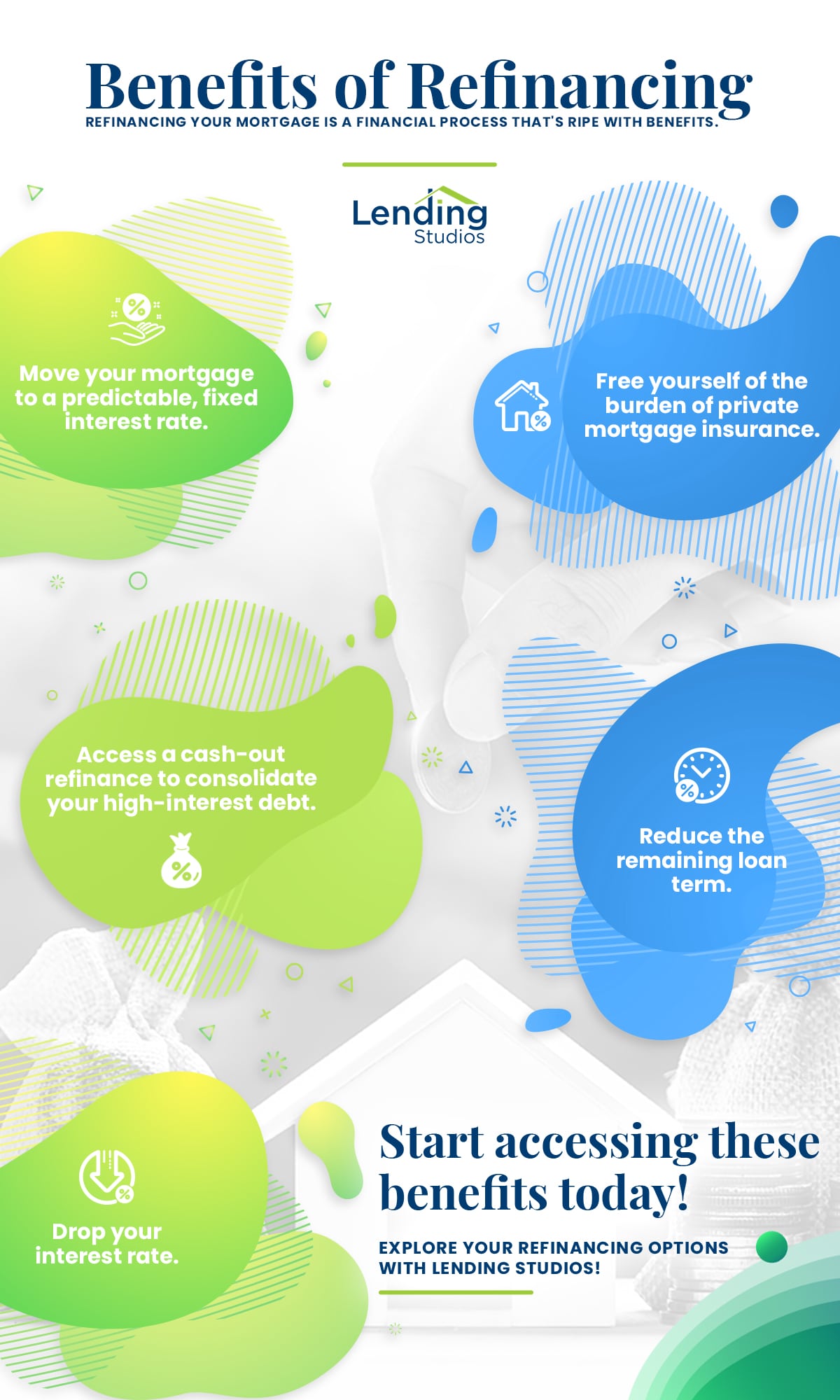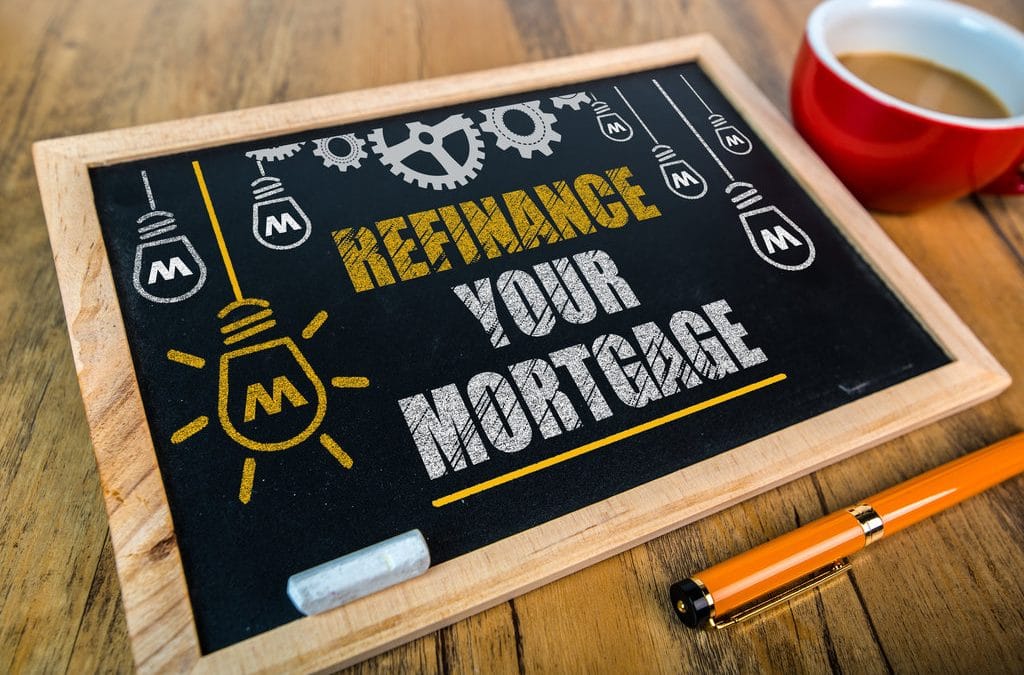In 2020, you might be considering refinancing your mortgage. Did you know that this year, interest rates are near record-setting lows? The decision to refinance a mortgage is one to take seriously. Refinancing can either save you money or cost you in the long run. It’s important to look at all of your options so you make the right decision for yourself financially. So, when is it right to refinance?
The Mortgage Bankers Association (MBA) is predicting that here in 2020, mortgage rates will remain low, but rise approximately 4% by the end of the year. If you’re unsure if refinancing makes the most sense for you now, Lending Studios can help you explore your options.
Refinancing your mortgage means that you will pay off your existing loan and replace it with a new one. People consider refinancing because of the benefits it could bring, like:
- Lowering your interest rate
- Consolidate high-interest debt
- Get rid of private mortgage insurance
- Moving to a fixed rate
- Reducing loan terms
To discover if mortgage refinance is right for you, consider the reasons above. Now, let’s break those reasons down and see just why they might be the reasons you decide to refinance today.

Lower your interest rate
Brown University defines interest as the cost of borrowing money. It begins to accrue when loan disbursements are made. The amount of interest you’re required to pay depends on multiple factors. Some of these reasons include: the amount of money borrowed, the rate at which interest is charged, and the total length of time of the loan’s lifespan. In the United States, interest rates are set by the Federal Open Market Committee and are are constantly changing. They can differ based on if it’s a short or long term loan, as well as the market and business needs of banks.
If you have a short-term loan, banks will lower or raise these loans to help them remain stable with the economy. For long-term rates, interest is determined by the demand for 10 or 30-year US Treasury notes. For example: low demand for long-term notes equals higher rates and vise versa. Higher demand amounts to lower rates. If you have a fixed-rate mortgage, it normally falls under a long-term rate, which means it’s generally lower than most.
The needs of banks are also responsible for affecting interest rates along with the market and the borrower. Investopedia explains this by saying, “someone with a lower credit score may be at a higher risk of default, so they pay a higher interest rate.”
Getting a lower interest rate is one of the top reasons why people decide to refinance their mortgages. Along with saving money, lowering your interest rate also increases the rate you build up equity in your home. This in turn will help decrease your monthly payments.
Lending Studios Tip: only refinance if you can reduce your interest rate by 1-2% minimum. This will give you enough savings to make the financing worth it in the long run.
Consolidate high-interest debt
Consolidating debt means you roll all of your debts into a single payment with a lower interest rate. Not only can this reduce your total debt, but in some instances you can also pay it off faster.
An option within this is to use home equity to consolidate your debts. However, NerdWallet says this can be risky, so it’s not a decision to take lightly. So what’s the risk? When you look into your home equity for this cause, you are using your home as collateral. If you can’t pay, you lose your home. However, interest rates on home equity loans are usually lower. Also, this interest paid could be tax-deductible.
Home equity loans are a second mortgage based on your home’s value. You’ll get a lump sum of money, which you can use to pay off your debt. This will come with a fixed monthly repayment schedule.
Consolidating debts can make your payments easier each month by only having to worry about one overall payment, which is quick and convenient.
Get rid of private mortgage insurance (PMI)
Refinancing a mortgage to get a lower interest rate could also mean you can have your private mortgage insurance (PMI) removed. This works when your new mortgage is for <80% of your home’s current appraised worth. In most cases anyway, you’ll need an appraisal to refinance your mortgage. By doing this, you’ll also have the basis of your new mortgage and get rid of your PMI. Win/win!
In certain cases, like having a government-backed loan, refinancing your mortgage is all you can do to eliminate the PMI. This entails refinancing a government-backed loan to a conventional mortgage.
By eliminating your PMI, you will save money each month because that’s a payment you will no longer be responsible for. If you do have a PMI, you have to have >20% equity in your home. Once you’ve achieved this, get with your lender to cancel this – they’re required to drop it!
Lending Studios Tip: Making one extra mortgage payment a year could be enough to get your equity up to where you can drop the PMI faster.
Move to a fixed rate
This is another one of the most common reasons people refinance their mortgages. When able to move from an adjustable-rate mortgage (ARM) to a fixed-rate, you’re saving yourself the ‘what if’s’. Adjustable rate mortgages give you the benefit of having a lower interest rate for a while, but they can change and go up, which could leave you in a bind. If you just received notice that your ARM is about to change, considering moving to a fixed-rate.
A fixed-rate doesn’t fluctuate. The rate you get with this is the rate it stays. It might apply for a portion of the loan or its entire life, but it remains stable and set throughout the time period it’s given. With a fixed-rate, you avoid the risk of the payment increasing over time.
Reducing loan terms
Many chose to refinance their mortgage to reduce their loan term. This means that, by refinancing, you can reduce the life of your loan. When you’re first purchasing your home, a 30-year mortgage can seem appealing for your finances at that moment. However, if you find you want to pay off your mortgage as fast as you can, reducing them term by refinancing is a good option.
In some instances, refinancing allows the borrower to take off 5, 10, even 20 years off their loan. When doing this, the borrower can also benefit from the lower interests because of the shorter term. Reducing a loan term means that you shorten the length of time you’ll be making payments, which can be great thing.
While lowering your interest rate, consolidate high-interest debts; getting rid of private mortgage insurance, moving from to a fixed rate, and reduce a loan term are all attractive options to refinance your mortgage, sometimes it’s not a good idea. Here are some instances when you might want to wait to refinance:
- When interest will actually increase, especially if your new loan has a longer term.
- It will make you go back to the beginning of the process. This means most of your payments are only covering interest.




